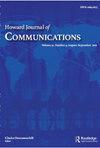“我们盘子里还有一件事让我们不愿意待在这里”:非裔美国人在COVID-19期间的经历
IF 0.8
Q3 COMMUNICATION
引用次数: 0
摘要
非洲裔美国人作为一个历史上被边缘化的群体,由于奴隶制和歧视的遗留问题而遭受社会耻辱。冠状病毒(COVID-19)大流行给非裔美国人带来了独特的挑战,他们面临着与大流行相关的耻辱,特别是对疾病检测、治疗和传播的影响。这项研究的重点是非洲裔美国人在COVID-19期间的社会耻辱经历。在Goffman(1963)和Link and Phelan(2001)的社会污名框架的指导下,一个由26名非洲裔美国成年人组成的多元化群体参与了这项研究。对数据的专题分析表明,与会者表示,COVID-19造成了另一层需要处理的污名和歧视。此外,与会者认为媒体和公共卫生报告进一步侮辱了黑人社区。与会者还报告了就COVID-19信息发表意见的紧迫性和责任。调查结果为解决公共卫生信息传递中与covid相关的污名的卫生传播方法提供了见解。本文章由计算机程序翻译,如有差异,请以英文原文为准。
“Just One More Thing on Our Plate that Makes it Undesirable to be around”: African Americans’ Experiences during COVID-19
Abstract As a historically marginalized group, African Americans experience social stigma resulting from the legacies of slavery and discrimination. The coronavirus (COVID-19) pandemic presents unique challenges for African Americans in coping with pandemic-related stigma, specifically with implications for disease testing, treatment, and spread. This research focused on African Americans’ experiences with social stigma during COVID-19. A diverse group of twenty-six African American adults participated in this study, which was guided by the social stigma frameworks of Goffman (1963) and Link and Phelan (2001). Thematic analysis of data suggests that participants expressed that COVID-19 created another layer of stigma and discrimination to manage. Additionally, participants viewed media and public health reports as further stigmatizing Black communities. Participants also reported urgency and responsibility for their well-being and agency in developing opinions on COVID-19 information. Findings offer insight into health communication approaches to address COVID-related stigma in public health messaging.
求助全文
通过发布文献求助,成功后即可免费获取论文全文。
去求助
来源期刊

Howard Journal of Communications
COMMUNICATION-
CiteScore
2.70
自引率
10.00%
发文量
23
期刊介绍:
Culture, ethnicity, and gender influence multicultural organizations, mass media portrayals, interpersonal interaction, development campaigns, and rhetoric. Dealing with these issues, The Howard Journal of Communications, is a quarterly that examines ethnicity, gender, and culture as domestic and international communication concerns. No other scholarly journal focuses exclusively on cultural issues in communication research. Moreover, few communication journals employ such a wide variety of methodologies. Since issues of multiculturalism, multiethnicity and gender often call forth messages from persons who otherwise would be silenced, traditional methods of inquiry are supplemented by post-positivist inquiry to give voice to those who otherwise might not be heard.
 求助内容:
求助内容: 应助结果提醒方式:
应助结果提醒方式:


